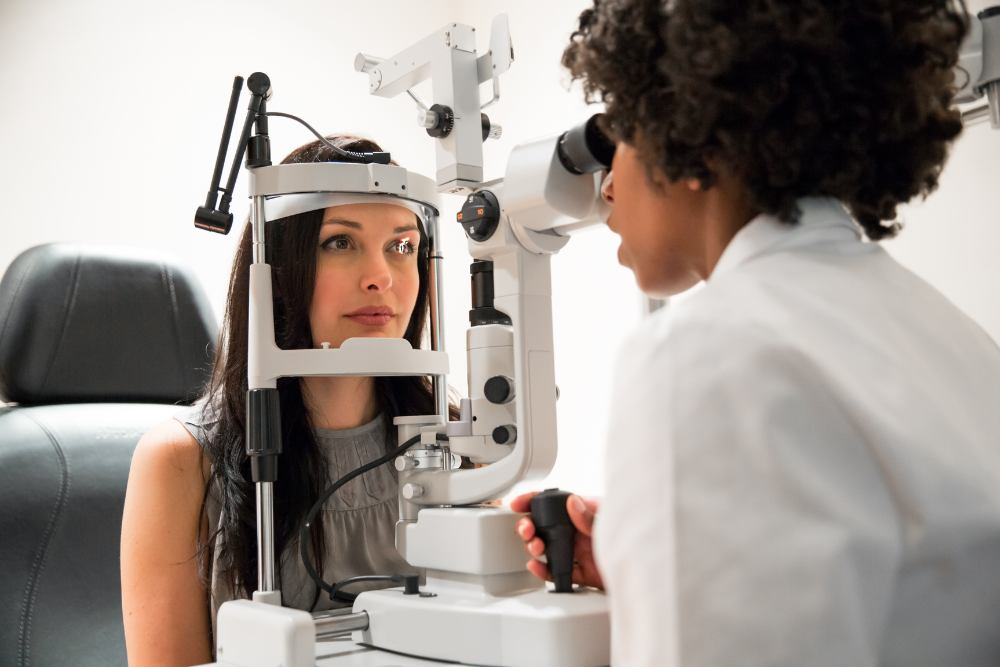Pre-Fight Medical Exams: Comprehensive Care for Fighters
Before entering the ring, your health and safety are paramount. Many state commissions require medical clearance to ensure you're fit to compete, and a thorough pre-fight exam is an essential step. From detailed eye exams to full physical evaluations and EKGs, our team of expert physicians provides the care and testing needed to help you meet regulatory requirements and protect your well-being. We’re here to ensure you’re prepared to compete at your best—safely and effectively.
Ophthalmologist Eye Exam
Depending on your age and the state commission’s requirements, you may need an optometrist or ophthalmologist exam before receiving clearance to fight. This crucial exam helps identify any existing eye conditions or risks that could impair your performance or increase the chance of permanent damage during a fight.
Our professional team provides expert guidance and conducts comprehensive eye exams to ensure you’re fully prepared.
What the Exam Covers:
Medical History Review:
- Overall and family vision history
- Current medications
- Vision issues or symptoms
- Use of glasses or contacts
Vision Test:
- Identify shapes, symbols, or letters on an eye chart from varying distances.
Refraction Test:
- Uses lenses to detect refractive errors and determine your corrective lens prescription.
Dilated Eye Exam:
- Eye drops may be applied to enlarge your pupils, allowing a closer examination of the retina, optic nerve, and blood vessels.
Additional Checks:
- Peripheral vision and eye muscle health
- Color vision test using symbols
- Glaucoma screening with a non-invasive puff of air
Physical Exam
A physical exam is another key requirement for pre-fight clearance, as mandated by your state’s commission. Our doctors will assess your overall health and identify any injuries or conditions that could hinder your performance or risk further injury during a fight.
What the Exam Covers:
Medical History Review:
- Family medical history to check for hereditary conditions like blood disorders or diabetes
- Personal history, including surgeries, allergies, medications, and substance use
Physical Evaluation:
- Ears: Check for hearing impairments or infections.
- Face: Look for deformities that could affect breathing or mouthpiece fit.
- Heart: Evaluate for conditions like arrhythmias or congenital heart disease; may include EKG testing.
- Lungs: Assess for issues like bronchitis or emphysema.
- Brain and Spine: Look for neurological concerns, motor skill impairments, or spinal abnormalities.
- Bones and Joints: Check for arthritis, muscular dystrophy, or spinal disc disease.
- Torso: Identify hernias or enlarged organs. Endocrine System: Screen for thyroid or adrenal gland dysfunctions.
- Skin: Examine for rashes, lesions, or anomalies.
- Blood Pressure: Ensure it is within acceptable limits.
EKG Testing
An electrocardiogram (EKG) is a critical tool for evaluating your heart's health. This non-invasive test measures your heart's electrical activity, detecting abnormalities like arrhythmias, structural defects, or signs of previous heart attacks.
What the Test Reveals:
- Heart Rate and Rhythm: Identifies irregular or abnormal rhythms.
- Evidence of Heart Damage: Shows patterns of past heart attacks or insufficient blood flow.
- Structural Issues: Detects enlargement or defects in heart walls or chambers.
Our team will review your EKG results and provide a detailed report. If concerns arise, we’ll connect you with a specialist to address any issues.
Get Started with Our Intermediate Package Today!
Your health is the foundation of your success in the ring. Our comprehensive pre-fight exams ensure that you meet commission standards while safeguarding your well-being. From in-depth eye exams to full physical evaluations and advanced EKG testing, our expert team provides the care and expertise you need to compete with confidence.
Schedule your pre-fight medical exam today and take the next step toward achieving your goals—safely and effectively.


